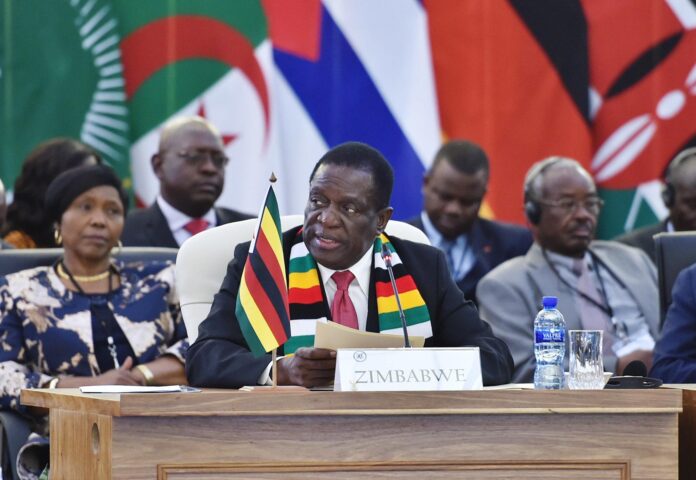Zimbabwe’s Information Minister, Jenfan Muswere, has stated that there is no vacancy in the President’s office, as many ZANU-PF supporters rally behind the Vice President to replace Emerson Mnangagwa when his term expires. Muswere’s comments are concerning, as they suggest that the party does not respect the country’s democratic principles.
President Mnangagwa’s term is set to end in 2028, and for the sake of democracy, it must conclude as mandated by the constitution. However, he has been undermining this mandate by allowing his supporters to advocate for changes to the constitution. This effort has been emboldened by the collapse of Nelson Chamisa’s Citizens Coalition for Change (CCC), which led to ZANU-PF gaining more seats in parliament. This increased parliamentary majority could enable them to change the constitution, further undermining the democratic process.
Mnangagwa has often claimed to have brought democracy to the country and opened Zimbabwe for business. He needs to demonstrate this by allowing the democratic process to unfold. This would involve permitting his party to begin selecting his successor without sending his loyalists to insult citizens who are rightly entitled to choose a new leader.
Allowing this process to commence now would ease the tension in the country’s democracy and could show the world that Zimbabwe has matured democratically. Perhaps I am being optimistic, but Zimbabwe needs to practice smooth transitions, which could go a long way in stabilizing the country and instilling confidence in its future.
Zimbabwe’s political history has been marked by significant shifts and turns. The country gained its independence from white minority rule in 1980, with Robert Mugabe becoming the first Prime Minister. Mugabe’s early years were characterized by hope and reconciliation, but soon the government was engaged in internal conflicts, such as the Gukurahundi, a series of massacres against the Ndebele people in the 1980s.
The economic crisis of the 1990s further exacerbated the country’s challenges, leading to the controversial Fast Track Land Reform Programme in the early 2000s. Political tensions continued to rise, culminating in the 2017 coup that saw the ousting of Mugabe and the rise of Emmerson Mnangagwa as President.
The post-coup era has been marked by political drama and deeper economic challenges. For Zimbabwe to truly mature as a democracy, it is crucial for the ruling party to embrace democratic principles and allow for smooth transitions of power. This would not only stabilize the country but also instil confidence in its future on the global stage.
However, the leadership in Zimbabwe does not seem to respect democracy and often undermines it through their actions. Activists exercising their democratic rights, such as Jameson Timba and Morgan Tsvangirai, have been imprisoned in the past. This behaviour further erodes the democratic fabric of the nation and highlights the need for genuine commitment to democratic principles.
Jameson Timba, interim leader of the Citizens Coalition for Change (CCC), was arrested along with 70 other activists in Harare for allegedly holding an unauthorized political meeting. The arrests led to violent clashes, with several CCC members sustaining injuries during the confrontation. Timba and the activists were charged with “gathering with intent to promote public violence and disorderly conduct”.
Morgan Tsvangirai, a key figure in the opposition to former president Robert Mugabe, faced multiple arrests and charges throughout his political career. In 2000, he was arrested and charged with treason, a charge that was later dismissed. In 2003, Tsvangirai faced another treason trial, marked by scuffles and arrests outside the court. Despite these challenges, Tsvangirai remained a prominent advocate for democracy and human rights in Zimbabwe until his death in 2018.
In addition to the arrests of opposition figures, some ZANU-PF members, such as Jonathan Moyo and Saviour Kasukuwere, have fled the country since the coup. They face arrest and imprisonment as their loyalties are not with Mnangagwa. Moyo and Kasukuwere sought refuge in exile, with Moyo reminiscing about the coup and Kasukuwere detailing how he survived intense gunfire during the November 2017 coup.
Zimbabwe has a long history of activism, with individuals and organizations advocating for human rights, social justice, and political reform. Notable activists include Evan Mawarire, founder of the #ThisFlag movement, which emerged in 2016 in response to widespread corruption, economic hardship, and political repression. Beatrice Mtetwa, a prominent human rights lawyer, has fearlessly defended freedom of expression, the rule of law, and democracy in Zimbabwe.
The judicial system in Zimbabwe has also faced significant challenges. The relationship between history, law, and politics in Zimbabwe has been marked by the mobilization of law’s coercive power by consecutive colonial and post-colonial governments. The justice system comprises various elements, including the Supreme Court, the High Court, and the Magistrates’ Courts. However, the independence of the judiciary has been compromised, with the executive exerting influence over judicial appointments and decisions.
This captured judicial system further undermines the democratic principles that Zimbabwe needs to uphold. For the country to move forward, it is essential to restore the independence of the judiciary and ensure that activists and citizens can exercise their democratic rights without fear of persecution.
